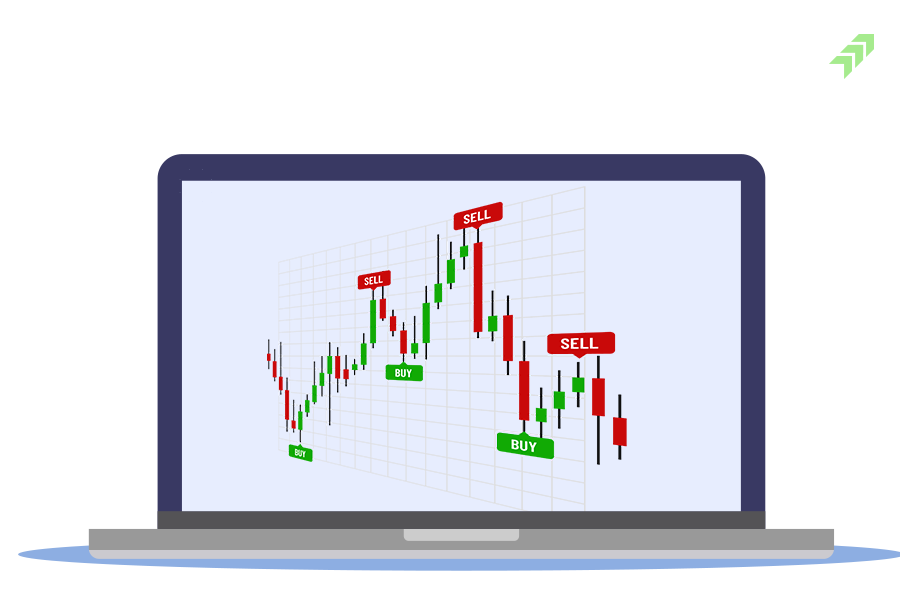Bullish Strategies
Bull Call strategy
Setup of the strategy
- Buy 1 call at lower strike
- Sell 1 call at higher strike
Also known by the name long call spread, it is a vertical spread made up of options trading strategies aimed to profit from a stock's finite price gain. A bull call spread consists of buying the lower strike call and selling the higher strike call, both of which expire at the same time. The bullish call spread aims to reduce stock losses while also capping gains.
The bull call spread lowers the cost of the call option, but there is a cost associated with it. Because of the lower and upper strike prices, the bull call spread's losses and gains are restricted. If the security price falls below the lower strike price—the initial, acquired call option—at expiration, the investor does not execute the option. The option strategy expires entirely useless, and the investor loses the initial net premium paid. Traders will utilise the bull call spread if they feel an asset's value will appreciate. If the security price has gone up and is trading above the upper strike price at expiry, the investor executes their first option with the lower strike price. However, the second, sold call option remains outstanding. The options buyer at a higher strike will automatically execute this call option. The positive payment from the first call option will be used to compensate for the two sold calls. As a result, earnings from the first call option purchased are restricted to the strike price of the sold option. The difference between the lower and upper strike prices, minus the net cost of entering into the contract, is the net cash flow.
The option premium collected from selling the call option partially compensates the premium paid by the investor/trader for purchasing the call option. Because the investor may only lose the net cost of creating the spread with a bull call spread, the risk is reduced. The strategy's disadvantage is that the gains are also restricted.
Let’s now take up a scenario to elaborate Bull Call option strategy.
Nifty 50is trading at 18485. Buy 18450 Call and sell 18750 Call
| Option Type | Expiry Date | Strike Price | LTP | Action | No. Of Lots |
| CALL | 29-12-2022 | 18800 | 164.75 | Sell | 1 |
| CALL | 29-12-2022 | 18500 | 327.55 | Buy | 1 |
Payoff detail
| Max Risk | Max Reward | Lower Break Even | Upper Break Even |
| 162.79999 | 137.20001 | 18662.8 | 18662.8 |
| Market Expiry | Payoff 1 | Payoff 2 | Net Premium | Option PayOff At Expiry |
| 18100 | 0 | 0 | -162.8 | -162.8 |
| 18150 | 0 | 0 | -162.8 | -162.8 |
| 18200 | 0 | 0 | -162.8 | -162.8 |
| 18250 | 0 | 0 | -162.8 | -162.8 |
| 18300 | 0 | 0 | -162.8 | -162.8 |
| 18350 | 0 | 0 | -162.8 | -162.8 |
| 18400 | 0 | 0 | -162.8 | -162.8 |
| 18450 | 0 | 0 | -162.8 | -162.8 |
| 18500 | 0 | 0 | -162.8 | -162.8 |
| 18550 | 0 | 50 | -162.8 | -112.8 |
| 18600 | 0 | 100 | -162.8 | -62.8 |
| 18650 | 0 | 150 | -162.8 | -12.8 |
| 18700 | 0 | 200 | -162.8 | 37.2 |
| 18750 | 0 | 250 | -162.8 | 87.2 |
| 18800 | 0 | 300 | -162.8 | 137.2 |
| 18850 | -50 | 350 | -162.8 | 137.2 |
| 18900 | -100 | 400 | -162.8 | 137.2 |

Bull put spread
Setup of the strategy
- Sell 1 put at higher strike
- Buy 1 put at lower strike
Also known as the credit put spread or short put spread, it is a vertical spread strategy in which an investor shorts a higher strike price put option and buys a lower strike price put option within the same expiry month. The strategy is made for getting a premium because the higher strike price put is more valuable than the lower strike price put. If the investor believes the market will remain flat or rise, they will employ this strategy. The lower put is used for hedging purposes, letting the investor restrict their maximum loss if the market moves lower.
The strategy is made up of one long put with a lower strike and one short put with a higher strike. Both put options have the same expiration date. A bull put spread is set up for a net credit and gains from either time erosion, rising stock price, or both. The potential profit is narrowed to the net premium paid less costs, whereas the potential loss is narrowed if the stock price falls below the long put strike price.
If the traders' assumption is incorrect and the stock falls instead, the method results in either a reduced profit or a loss for the investor. The long put limits the maximum loss.
Let’s now take up a scenario to elaborate Bull Put option strategy.
NIFTY is trading at 18485. SELL 18850 PUT AND BUY 18500 PUT.
| Option Type | Expiry Date | Strike Price | LTP | Action | No. Of Lots |
| PUT | 29-12-2022 | 18850 | 365.8 | Sell | 1 |
| PUT | 29-12-2022 | 18500 | 204.9 | Buy | 1 |
Payoff Details
| Max Risk | Max Reward | Lower Break Even | Upper Break Even |
| 189.1 | 160.9 | 18689.1 | 18689.1 |
| Market Expiry | Payoff 1 | Payoff 2 | Net Premium | Option PayOff At Expiry |
| 18100 | -750 | 400 | 160.9 | -189.1 |
| 18150 | -700 | 350 | 160.9 | -189.1 |
| 18200 | -650 | 300 | 160.9 | -189.1 |
| 18250 | -600 | 250 | 160.9 | -189.1 |
| 18300 | -550 | 200 | 160.9 | -189.1 |
| 18350 | -500 | 150 | 160.9 | -189.1 |
| 18400 | -450 | 100 | 160.9 | -189.1 |
| 18450 | -400 | 50 | 160.9 | -189.1 |
| 18500 | -350 | 0 | 160.9 | -189.1 |
| 18550 | -300 | 0 | 160.9 | -139.1 |
| 18600 | -250 | 0 | 160.9 | -89.1 |
| 18650 | -200 | 0 | 160.9 | -39.1 |
| 18700 | -150 | 0 | 160.9 | 10.9 |
| 18750 | -100 | 0 | 160.9 | 60.9 |
| 18800 | -50 | 0 | 160.9 | 110.9 |
| 18850 | 0 | 0 | 160.9 | 160.9 |
| 18900 | 0 | 0 | 160.9 | 160.9 |

Long Collar (long stock + long put + short call)
Setup of the strategy
Investor/trader must take position in the underlying
- Sell 1 call at higher strike
- Buy 1 put at lower strike
As a temporary, somewhat less-than-complete hedge against the impacts of a likely near-term drop in security price, the investor adds a collar to an existing long stock position. To execute this strategy, an investor buys a put option and writes a call option with the same expiration date to hedge a long position in the underlying securities. Typically, the investor will select a call strike that is higher than the stock price and a long put strike that is lower. There is considerable wiggle room, but the strike alternatives will influence both the cost of the hedge and the level of protection it offers. These strikes are referred to as the 'floor' and 'ceiling' of the position, and the stock is 'collared' between the two strikes.
The put strike specifies a floor, and a minimal exit price if the investor needs to sell during a downturn. The call strike sets a limit on stock gains. If the stock rises beyond the call strike, the investor should be prepared to sell. In exchange for agreeing on a maximum restriction on the investment's upside potential, the investor obtains a minimum price at which the security can be sold throughout the life of the collar.
Let’s now take up a scenario to elaborate Long Collar option strategy.
NIFTY is trading at 18486. SELL 19150 CALL, BUY 18450 PUT and LONG NIFTY FUTURE
| Option Type | Expiry Date | Strike Price | LTP | Action | No. Of Lots |
| CALL | 29-12-2022 | 19150 | 56.7 | Sell | 1 |
| PUT | 29-12-2022 | 18450 | 187.2 | Buy | 1 |
| FUTURES | 29-12-2022 | -NA- | 18628.4 | Buy | 1 |
Payoff detail
| Max Risk | Max Reward | Lower Break Even | Upper Break Even |
| 18429.5 | 533.3008 | 18616.7 | 18616.7 |
| Market Expiry | Payoff 1 | Payoff 2 | Payoff 3 | Net Premium | Option PayOff At Expiry |
| 18100 | 0 | 350 | -528.4 | -130.5 | -308.9 |
| 18150 | 0 | 300 | -478.4 | -130.5 | -308.9 |
| 18200 | 0 | 250 | -428.4 | -130.5 | -308.9 |
| 18250 | 0 | 200 | -378.4 | -130.5 | -308.9 |
| 18300 | 0 | 150 | -328.4 | -130.5 | -308.9 |
| 18350 | 0 | 100 | -278.4 | -130.5 | -308.9 |
| 18400 | 0 | 50 | -228.4 | -130.5 | -308.9 |
| 18450 | 0 | 0 | -178.4 | -130.5 | -308.9 |
| 18500 | 0 | 0 | -128.4 | -130.5 | -258.9 |
| 18550 | 0 | 0 | -78.4 | -130.5 | -208.9 |
| 18600 | 0 | 0 | -28.4 | -130.5 | -158.9 |
| 18650 | 0 | 0 | 21.6 | -130.5 | -108.9 |
| 18700 | 0 | 0 | 71.6 | -130.5 | -58.9 |
| 18750 | 0 | 0 | 121.6 | -130.5 | -8.9 |
| 18800 | 0 | 0 | 171.6 | -130.5 | 41.1 |
| 18850 | 0 | 0 | 221.6 | -130.5 | 91.1 |
| 18900 | 0 | 0 | 271.6 | -130.5 | 141.1 |

Synthetics
Synthetics are a method of creating an artificial financial position using a different technique. Derivatives enable investors to build multiple positions synthetically without having to utilise as much capital. Using options, there are numerous methods to generate synthetic positions. One of the benefits of having this synthetic position in security rather than possessing the security is that it is less expensive than holding the security outright. The options position might provide us with up to double the leverage of holding the stock overnight. This may allow us to enhance the return on the portfolio.
Synthetic long stock
The synthetic long stock strategy is an options strategy that mimics the reward of a long stock position. Traders construct such a strategy by buying at-the-money (ATM) calls and selling an equal number of at-the-money (ATM) puts with the same expiration date.
Setup of the strategy
- Buy 1 ATM Call
- Sell 1 ATM Put
Profit is made in this strategy when the underlying stock's price moves beyond the strike price of the long call options purchased during the life of an option. The profit is equal to the profit from the long call options, plus the revenues from the sale of put options, less the premiums paid for buying the call options and any transaction fees.
Synthetic long stock strategy is a double-edged sword in that they carry an endless level of risk while also offering an unlimited potential reward. The synthetic long stock position is less expensive to trade without committing all of the investment capital necessary to outright purchase a roughly equivalent number of shares of the underlying company. It may be formed with relatively little cash since the cost of the call options is offset in part by the money obtained from selling the put options. Because the entire price premium paid for purchasing a call option may be greater than the revenues from selling put options, traders may establish a synthetic long stock position with a debit.
Let’s now take up a scenario to elaborate Synthetic Long stock option strategy.
Nifty is trading at 18486. SELL PUT AT 18500 and BUY 18500 CALL.
| Option Type | Expiry Date | Strike Price | LTP | Action | No. Of Lots |
| PUT | 29-12-2022 | 18500 | 204.9 | Sell | 1 |
| CALL | 29-12-2022 | 18500 | 327 | Buy | 1 |
Payoff detail
| Market Expiry | Payoff 1 | Payoff 2 | Net Premium | Option PayOff At Expiry |
| 18100 | -400 | 0 | -122.1 | -522.1 |
| 18150 | -350 | 0 | -122.1 | -472.1 |
| 18200 | -300 | 0 | -122.1 | -422.1 |
| 18250 | -250 | 0 | -122.1 | -372.1 |
| 18300 | -200 | 0 | -122.1 | -322.1 |
| 18350 | -150 | 0 | -122.1 | -272.1 |
| 18400 | -100 | 0 | -122.1 | -222.1 |
| 18450 | -50 | 0 | -122.1 | -172.1 |
| 18500 | 0 | 0 | -122.1 | -122.1 |
| 18550 | 0 | 50 | -122.1 | -72.1 |
| 18600 | 0 | 100 | -122.1 | -22.1 |
| 18650 | 0 | 150 | -122.1 | 27.9 |
| 18700 | 0 | 200 | -122.1 | 77.9 |
| 18750 | 0 | 250 | -122.1 | 127.9 |
| 18800 | 0 | 300 | -122.1 | 177.9 |
| 18850 | 0 | 350 | -122.1 | 227.9 |
| 18900 | 0 | 400 | -122.1 | 277.9 |

Can move either Ways
Long straddle
Setup of the strategy
Long call
Long put
A long straddle strategy combines the best of both worlds. A long straddle is employed by buying a call and buying a put with the same strike and expiration date. Typically, investors employ a straddle when they anticipate a large price movement on either side or a high level of volatility in the near future. For example, the investor may be anticipating a court ruling against the company in the coming quarter, the outcome of which will be either extremely good or very bad for the company. The strategy is constructed for a net premium paid. There is no cap on potential profits that can be earned from strategy, whereas potential loss is limited to the total cost of employing the straddle.
Let’s now take up a scenario to elaborate Long Straddle option strategy.
NIFTY is trading at 18504. BUY 18500 PUT AND BUY 18500 CALL.
| Option Type | Expiry Date | Strike Price | LTP | Action | No. Of Lots |
| PUT | 29-12-2022 | 18500 | 202.1 | Buy | 1 |
| CALL | 29-12-2022 | 18500 | 329.5 | Buy | 1 |
Payoff detail
| Max Risk | Max Reward | Lower Break Even | Upper Break Even |
| 531.6 | Unlimited | 17968.4 | 19031.6 |
| Market Expiry | Payoff 1 | Payoff 2 | Net Premium | Option PayOff At Expiry |
| 18100 | 400 | 0 | -531.6 | -131.6 |
| 18150 | 350 | 0 | -531.6 | -181.6 |
| 18200 | 300 | 0 | -531.6 | -231.6 |
| 18250 | 250 | 0 | -531.6 | -281.6 |
| 18300 | 200 | 0 | -531.6 | -331.6 |
| 18350 | 150 | 0 | -531.6 | -381.6 |
| 18400 | 100 | 0 | -531.6 | -431.6 |
| 18450 | 50 | 0 | -531.6 | -481.6 |
| 18500 | 0 | 0 | -531.6 | -531.6 |
| 18550 | 0 | 50 | -531.6 | -481.6 |
| 18600 | 0 | 100 | -531.6 | -431.6 |
| 18650 | 0 | 150 | -531.6 | -381.6 |
| 18700 | 0 | 200 | -531.6 | -331.6 |
| 18750 | 0 | 250 | -531.6 | -281.6 |
| 18800 | 0 | 300 | -531.6 | -231.6 |
| 18850 | 0 | 350 | -531.6 | -181.6 |
| 18900 | 0 | 400 | -531.6 | -131.6 |

Long strangle
Setup of the strategy
- Buy OTM call option
- Buy OTM put option
A long strangle strategy is constructed for a net cost. The strategy involves going long on OTM calls and puts with different strike prices but the same expiration date.
When an investor/trader predicts a substantial move in stock price but the direction of the shift is unknown, this strategy can be applied. The method looks to benefit if the underlying security extends over the higher break-even point or falls below the lower break-even point. Strangles is typically bought before a significant news occurrence. Positive news can drive a stock price to rise, while negative news can lead a stock price to plummet. If there is no volatility in the security, the only risk remains.
Because the security price can have big upswings, the upside profit potential is endless. On the downside, the profit potential is significant but not limitless due to the possibility of the security price falling to zero only.
The overall cost of applying the strategy plus taxes is the highest probable loss. Both options will be worthless if the security price at expiration is equal to or between the strike prices.
Straddle and strangle are both similar strategies with comparable risk characteristics. The main difference between a straddle and a strangle is that a straddle is constructed with ATM options, whilst a strangle is constructed with OTM options. Both techniques employ a call and a put option from the same expiry cycle.
Let’s now take up a scenario to elaborate LONG Strangle option strategy.
Nifty 50 is trading at 18481. BUY 18550 CALL and BUY 18450 PUT.
| Option Type | Expiry Date | Strike Price | LTP | Action | No. Of Lots |
| CALL | 29-12-2022 | 18550 | 312 | Buy | 1 |
| PUT | 29-12-2022 | 18450 | 178.35 | Buy | 1 |
Payoff Detail
| Max Risk | Max Reward | Lower Break Even | Upper Break Even |
| 490.35 | Unlimited | 18059.65 | 18940.4 |
| Market Expiry | Payoff 1 | Payoff 2 | Net Premium | Option PayOff At Expiry |
| 18100 | 0 | 350 | -490.35 | -140.35 |
| 18150 | 0 | 300 | -490.35 | -190.35 |
| 18200 | 0 | 250 | -490.35 | -240.35 |
| 18250 | 0 | 200 | -490.35 | -290.35 |
| 18300 | 0 | 150 | -490.35 | -340.35 |
| 18350 | 0 | 100 | -490.35 | -390.35 |
| 18400 | 0 | 50 | -490.35 | -440.35 |
| 18450 | 0 | 0 | -490.35 | -490.35 |
| 18500 | 0 | 0 | -490.35 | -490.35 |
| 18550 | 0 | 0 | -490.35 | -490.35 |
| 18600 | 50 | 0 | -490.35 | -440.35 |
| 18650 | 100 | 0 | -490.35 | -390.35 |
| 18700 | 150 | 0 | -490.35 | -340.35 |
| 18750 | 200 | 0 | -490.35 | -290.35 |
| 18800 | 250 | 0 | -490.35 | -240.35 |
| 18850 | 300 | 0 | -490.35 | -190.35 |
| 18900 | 350 | 0 | -490.35 | -140.35 |




















1 Comment
[…] Also read Bullish option Strategies […]